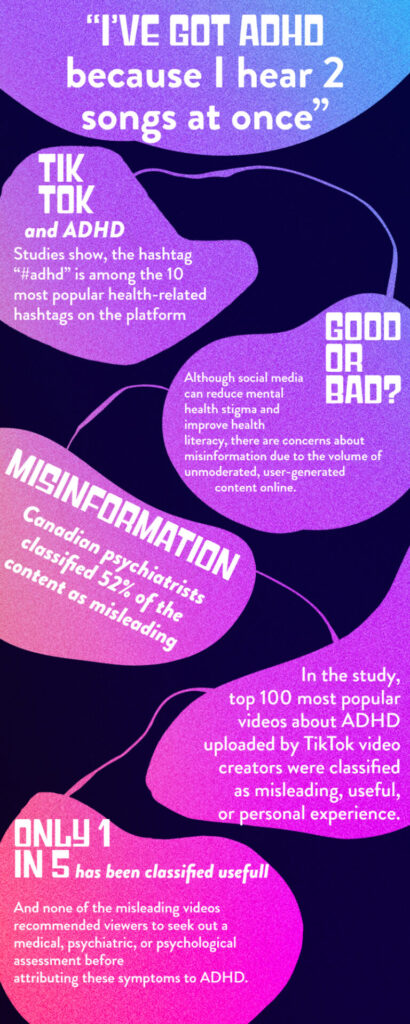Social media, such as TikTok has been a popular means of sharing mental health related information online.
ADHD in particular, has been one of the most popular topics, reaching average of 2.8 million views per video on the platform.
Since 2020 the The number of UK adults seeking a diagnosis of ADHD has increased by 400% according to Psychiatry UK.
However, not all information is accurate or helpful.

The problematic trend has been researched by Canadian psychiatrists who came to a conclusion that half of the content is misleading and potentially harmful.
The clips shared, usually contain personal experiences, tips, characteristic symptoms or even tests, apparently allowing people to self-diagnose with the attention-deficit/hyperactivity disorder.
There is concern that the issue seems to be romanticised in the social media, transforming the health condition into a trend, even something to be desired.
According to Dr Elia Abi-Jaoude, psychiatrist and author of the original study of user generated content regarding ADHD on Tik-Tok , there has been a sudden increase in people who think they might have ADHD.
He said: “It’s something that’s all over the place, I’m a psychiatrist I work with young people, I’ve seen a lot of patients wondering if they have it.
“More broadly, there’s been a massive phenomenon of social contagion about all sorts of things, mental health related,” he added.
Although, the increased awareness about mental health issues is undeniably a good thing, just as with any trends the spread of misinformation is inevitable and, in this case, could be damaging.
According to Dr Tony Lloyd, CEO of the ADHD Foundation Neurodiversity Charity: “Self-diagnosing with any medical condition is a concern if the information available to people is inaccurate or misleading.
“Accessing timely and clinically-sound medical guidance has become increasingly difficult in the UK since the start of the pandemic.”
Good or bad?
Hermione La Chapelle, 23, who was diagnosed with ADHD in 2019 thinks this information spread on TikTok is highly unhelpful.
She said: “Before TikTok, which is when I found out about my ADHD, I used to think that social media was a really good source for diagnosis. But it was completely different, it wasn’t so ‘clickbaity’ I suppose.”
Although Hermione was critical about the quality of some of the content, she defended self-diagnosing and even described it as essential.
In her case, it all started with questioning whether she had ADHD herself and researching the topic on her own before contacting a professional to access a proper assessment.
Hermione said: ‘I think self-diagnosis is important, the most important really.
“However, it depends on what your research is based on and which is then backed up by psychologists and doctors.
“In fact, I think that is the best way of diagnosis. Whereas the TikTok videos – they are so silly.”
She perceived the videos as generalising, describing things ‘that can make anyone think they have it’.
Dr Abi-Joude, however, expressed his concerns about people self-diagnosing.
He said: “It’s great to explore yourself, but TikTok is probably not the best place to learn about something.”
He explained: “The problem is, often the labels are used as the answer but they should be just the beginning.
“The problem is when the label shuts the conversation because it acts as if it’s the answer but it’s only describing what you’re going through.”
Fuzzy concept
The diagnosis of ADHD is one of the trickiest. It’s not something a patient either has or not, it’s often described as a spectrum.
Dr Abi-Joude said most of the people who self-diagnose with attention-deficit/hyperactivity disorder focus more on the attention part, rather than other aspects.
He said: “We are all on a spectrum of how largely we are able to focus.
“Most of us are somewhere in between. Where do we draw the line is arbitrary. Where do we decide we’re going to call this ADHD or not is arbitrary.
“It’s easy with one extreme or another but a lot of us are somewhere in between.”
He pointed out that in the modern world ‘there are a lot of things also to be aware of that can affect our ability to pay attention, to stay focused’.
One of the factors that negatively impact our ability to focus, which Dr Abi-Joude identified, is simply that ‘we live in a world that’s jampacked with stimulation’.
“We’re constantly bombarded with stimuli to keep us engaged. The constant distraction of having the whole world, for instance in the smartphone, at hand makes it a lot harder to then focus on less exciting, tedious tasks.
“And then there’s the screens,” he added.
The blue light released by mobile devices supresses melatonin and disrupts natural sleep patterns.
He said: “A lot of people are constantly sleep deprived today. Well, guess what? Good luck paying attention while you’re sleep deprived.”
Therefore, the increased demand for ADHD diagnosis may in fact be a result of our decreasing ability to pay attention.
Label vs lifestyle
According to Dr Tony Lloyd: “A good analogy is diabetes – with the correct information and support to make lifestyle changes you can remain healthy.”
Hence, whether somebody has that label or not, the most important thing is to learn about oneself. Of what helps, what works, why one is having trouble focusing and what are the adjustments that can be made to improve things.
Dr Lloyd said: “People should be ‘enabled’ to take responsibility for their health and well-being with accurate information about lifestyle choices and strategies to manage any health need – including ADHD.”
Similarly, Dr Abi-Joude said: “I think if you’re a successful journalist writing for major outlet or have very high marks I would question the label, how useful it is.
“You may struggle more with paying attention than the average person, but you’re probably better at trying to figure out what are the things you can do in your life to improve it.”










